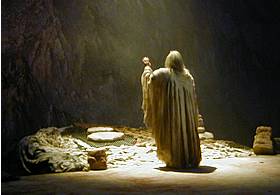
Exodus 32:9-11 "The Lord said to Moses, “I have seen this people, and behold, they are an obstinate people. 10 Now then let Me alone, that My anger may burn against them and that I may destroy them; and I will make of you a great nation. 11 Then Moses entreated the Lord his God, and said, “O Lord, why does Your anger burn against Your people whom You have brought out from the land of Egypt with great power and with a mighty hand?"
Exodus 32:14 "So the Lord changed His mind about the harm which He said He would do to His people."
Malachi 3:6 “For I, the Lord, do not change; therefore you, O sons of Jacob, are not consumed."
Introduction: God is unchanging and yet scripture states He changes His mind
Today's post deals with a difficult matter of interpretation in the scripture relative to God's nature in relationship to prayer. When we speak of God as "unchanging", the term used to describe this quality of God is called "immutability". Hebrews 1:11-12 (quoting Psalm 102:26) states concerning Christ's Divine nature in relationship to the heavens - "They will perish, but You remain; And they all will become old like a garment, 12 And like a mantle You will roll them up; Like a garment they will also be changed. But You are the same, And Your years will not come to an end.” Malachi 3:6, quoted at the beginning of this post, asserts that God does not change. In James 1:17, we are told that the Heavenly Father is the Father of Heavenly lights, in whom there is no variation or shifting of shadow. Such statements strongly affirm that within God's eternal nature, attributes and moral character, there is a constant, continuous, non-varying manner in His overall Divine life.
But then we run across other passages of scripture that seem to indicate God "changing something". For the purposes of today's post, we find specific cases were God seems to change his mind in the contexts of prayer and people repenting of their sins. Certainly Exodus 32 depicts Moses interceding for the people in light of their treachery of the Golden Calf. Once Moses interceded and appealed to the unvarying promises that Yahweh made to Abraham, Isaac and Jacob (Exodus 32:13), God "changed His mind" relative to the destruction He planned to do against the nation of Israel (see Exodus 32:14). Other texts such as 1 Samuel 15:10-11, 28-29 and Jonah 3:10 portray God "changing His mind" or "repenting" of the judgments He was going to pour out on the people.
So how do we reconcile these two categories of scripture? How do we understand the clear statements of God being "immutable" and thus, not subject to change within His internal character and being, whilst seeing scriptures that assert the "changing of His mind". Furthermore, how does this affect our understanding of prayer relative to God?
Illustration: The sun and melted wax in a hot car
Not too long ago I had been in the back of our family car when I noticed what appeared to be melted wax near one of the cup holders. My wife enjoys wax-warmers. They are little "peanut-butter-cup-shaped" pieces of wax one places in a special device called a "wax-warmer". Once these "wax-warmers" are melted, they emit the given scent of what one would smell from an actual burning candle.
On a particular occasion my wife had purchased some of these little objects and one of our children had been playing with one of them and put it near the cup-holder. In the heat of a hot-summer day, the interior temperature of the car and the sun blazing through the windows had softened the little wax-warmer enough to melt it. Once it had cooled, it turned back into hardened wax and left a nice little task for someone to clean.
Now I tell this little tale to highlight our discussion. What changed? Did the sun change? No. Whether there was wax or not didn't effect the sun shining forth some 93 million miles away. Would the wax warmer had melted by itself if it had not been placed in the hot car on a sunny day? Likely. But now we interpose a car window, infrared radiation heat bouncing around in the car and a hot surface, and lo and behold: a melted wax-warmer. The wax-warmer changed relative to its placement in that hot car. We of course would say that the sun had heated up enough to melt the wax-warmer, even-though the sun's heat and light remained constant. It is from the vantage-point of inside the car that we use the language of change. In this illustration, the wax-warmer was changed, not the sun. It was changed due to what was interposed between it and the sun - namely the window.
We can say for now that the passages that speak of God's unchanging character (or "immutability) are illustrated by the sun in the above comparison. Likewise, the other scriptures that refer to God "changing His mind" compare to the above illustration. With regards to prayer, it corresponds to the windows of the car through which the sunlight is shining. When we pray, we are, as it were, putting forth windows through which God can shine forth His unvarying purposes. In short, the answer to the question of whether or not prayer changes us or God is: prayer is designated by God to change us and our situations.
In the next post we will draw out further implications and conclusions about our discussion on whether prayer changes us or God.

No comments:
Post a Comment